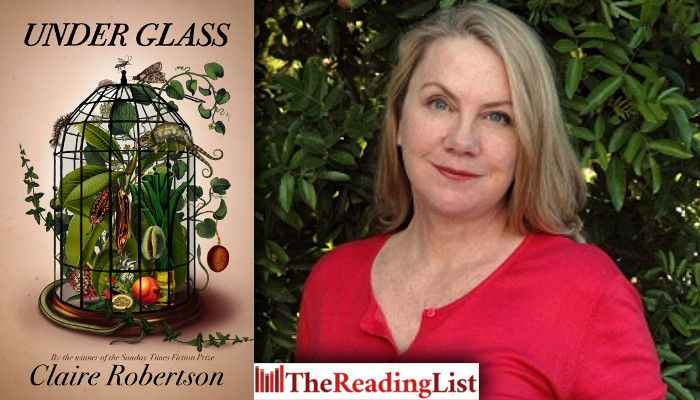Read an extract from Under Glass, the new novel from award-winning author Claire Robertson
More about the book!

Set in Natal in the nineteenth century among the settlers and the homesteaders and the sugar-cane farmers, Claire Robertson’s masterful new novel Under Glass tells the story of Mrs Chetwyn, who arrives in Port Natal from India in 1856.
At once a deeply researched historical novel and an intriguing mystery, Under Glass is a high-stakes narrative of deception and disguise that will appeal to a range of readers of literary fiction by one of the country’s finest novelists.
Click on the link above for more about the book!
Read an excerpt, shared by Penguin Random House SA:
Small boats are coming to meet them. At first light they were swung by barrel chair from the Lady Lee to this large yacht to cross the sand bar of legend, and now they will drop into open skiffs. Mrs Chetwyn, as she waits her turn, tidies her recent quarter-year into patterns: the Lady Lee, two hundred and two passengers, almost three months (at the end of which the forbiddingly large ship had shrunk to a croft, a mousehole, a crowded irritation so profound it was almost calming in the way it seized her brain), then half an hour among twenty or so women in the hold of the yacht, now five or six of them at a time on the unnamed little surf boats and as many minutes on that journey entire.
At the end of the ride over the surf, one last conveyance yet stands between them and the shore. It is occasioning small screams from some of the women. Mrs Chetwyn cocks an ear to them: the musical yelps are a publication of reluctance, a plea in mitigation of the immodesty to which the women are bent: obliged to object, they object. She translates for herself the lamentations of one Scattergood, and understands by her unconvincing shrieks: ‘Know you, and you women most particularly, it is through no fault of my own that my arms are laid upon the shoulders of this ebony specimen pair, and theirs crossed beneath my seat, and their breath hot on my bosom.’ Delight and fright, frothing.
Successively shorter periods spent in progressively smaller vessels have given the journey the air of speeding up, and of moving towards a vanishing point. Now, from the great ship and its months down to the boats and their minutes, each woman is spending only seconds on the crossed arms of a pair of all-but-naked men before landing with dry skirts and boots upon the sand.
Mrs Chetwyn watches from the bucking surf boat as Sophronia and Griffin are carried ashore with less ceremony by a man apiece. When it is her turn she places one gloved hand on the nearest shoulder of each of hers and lowers herself backwards onto their crossed arms. As she feels their bodies brace against a knee-high surging wave, she says to herself – and almost says aloud, in encouragement – that if they can bear what must be borne, she can too; it is the sort of pun that her husband would have made, were he here to see his family ashore.
But Chetwyn is ashore already, deep in the daunting bush, and she has charge of them, directing the ayah and the little girl towards what she takes to be a customs shed, and searching in her pocket for the letter with the name of the agent, and preparing to manage the business of bringing ashore the heap of goods she had had hauled aboard from a Plymouth dock in the grey winter that preceded this hot autumn.
By her side, no higher than her mother’s waist, stands Sophronia, dressed as thoroughly as Mrs Chetwyn from bonnet to buttoned boots. Behind both Chetwyns, as desiccated as they are dewy, cockerel-coloured in red and orange and black when they are doves, tall Griffin twitches her folds and counts her bracelets, and bends at the waist to reach down and flick the ribbon of the little girl’s cape off her shoulder to join its twin in front. Sophronia, mildly smiling, looks down, burrows her boots into the sand.
Between the Chetwyn party and the small waves, women are uniting with their husbands, and families are counting their members, counting again and reaching with small gestures to touch one another – a hand on a shoulder, a head cupped or tousled. The woman Scattergood, attached to the Drummond party nominally as a mother’s help but known by all on the ship since the first storm to be as much trouble to the mother as all eight of her small children acting in concert, is settling herself as a duck might when, having impressed itself with flight, it has also managed to regain the Earth. A wall-eyed party of some forty years, she is executing a deliberate fussy disturbance of her person as if to signal that she is too busy with her tail feathers to give comment on the excellence of her landing, though you may do so. This is manifest in the twitching of her pelisse and the settling of her skirt folds, then the settling of them anew. She, like the rest of the party still on the shore, faces the sea as she fusses. Then they turn, almost in concert, and face the land.
Categories Fiction South Africa
Tags Book excerpts Book extracts Claire Robertson Penguin Random House SA Under Glass
